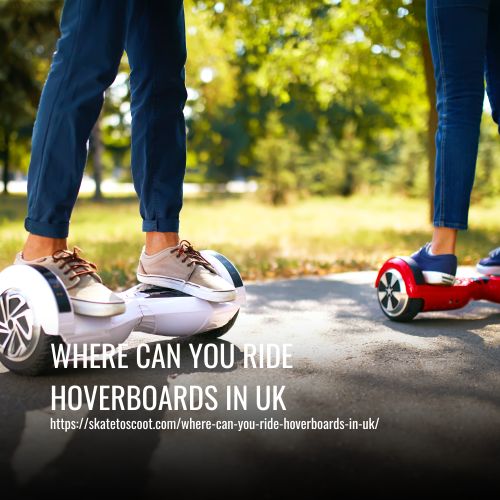As an Amazon Associate we earn from qualifying purchases.
In the UK, it is indeed illegal to ride a hoverboard on public roads or pavements. However, this does not mean that you cannot enjoy riding your hoverboard altogether. Hoverboards can be used on private property, such as your own backyard, or within the confines of private parks or shopping centers with permission.
As long as you are not riding your hoverboard on public roads or paths, you can still have fun on this self-balancing scooter. It is important to note that hoverboards are not classified as motor vehicles and therefore do not require road tax or vehicle type approval.

Why are hoverboards considered a problem in public places legally?
Hoverboards are considered a problem in public places legally due to several factors. Firstly, hoverboards, like other electric rides, are not insured, which means that in the event of an accident, the injured party may not receive any financial compensation.
This lack of insurance coverage raises concerns about the potential liability and financial burden on individuals and property owners. Additionally, there are existing laws and regulations that govern the use of powered transporters, such as hoverboards, in public spaces, and failure to comply with these regulations can result in fines or other penalties.
Furthermore, there are safety concerns associated with hoverboards, as they can reach high speeds and may pose a risk to pedestrians and other road users. Overall, the main problem with hoverboards in public places is the lack of insurance coverage, compliance with existing laws, and potential safety hazards.
Can You Ride a Hoverboard on Private Property in the UK?
When riding a hoverboard on private property, it is recommended to wear appropriate safety gear such as helmets, knee pads, and elbow pads. This is especially important for beginners or those riding at high speeds. It is also advisable to choose a smooth surface for riding, avoiding uneven or slippery terrain that could increase the risk of accidents.
Additionally, it is important to be considerate of others when riding a hoverboard on private property. Avoid crowded areas and be mindful of pedestrians, especially children or elderly individuals who may not be able to move out of the way quickly.
While riding a hoverboard on private property is generally allowed, it is still essential to comply with any local regulations or guidelines that may exist within a specific area or property. It is always a good idea to check with the property owner or management for any rules or restrictions before riding a hoverboard.
What are the Rules for Using a Hoverboard on Private Property?
Firstly, it is recommended to wear safety gear, including helmets, knee pads, and elbow pads. This is especially important for beginners or those riding at high speeds. These safety measures can help prevent or minimize injuries in case of accidents.
Secondly, it is crucial to choose a suitable surface for riding. Avoid uneven or slippery terrain that could increase the risk of accidents. It is best to ride on smooth and stable surfaces such as concrete or asphalt. This will provide better control and stability while riding.
Lastly, it is important to be considerate of others when riding on private property. Avoid crowded areas and be mindful of pedestrians, especially children or elderly individuals who may not be able to move out of the way quickly. Respecting others’ privacy and property is also essential when riding a hoverboard on private land.
Are there any Restrictions for Riding a Hoverboard on Private Property?
While hoverboards are allowed on private land, they are not permitted to be used on public property, including public parks. This restriction is in place for safety reasons, as hoverboards can pose a risk to pedestrians and other users of public spaces. Therefore, it is important to respect these rules to ensure the safety of everyone involved.
When riding a hoverboard on private property, it is essential to be considerate of others. Avoid crowded areas and be mindful of pedestrians, especially those who may be more vulnerable such as children or the elderly. Respecting the privacy and property of others is also crucial when using a hoverboard on private land.
It is worth mentioning that while riding a hoverboard on private property may be allowed, it is always advisable to check with the landowner or seek legal advice to ensure compliance with local regulations. Safety should always be the top priority, so wearing appropriate safety gear and choosing suitable surfaces for riding is highly recommended.
So Where Can I Ride My Hoverboard UK?
You can ride your hoverboard or electric scooter on private land in the UK, as long as you have the permission of the landowner. However, current rules prohibit their use on public property, including public parks. It is important to note that these rulings may change in the future.
In some European countries and in the US, electric scooters and hoverboards are allowed on pavements and cycle lanes. Some UK organizations, such as BAA at Heathrow airport, have recognized the benefits of these personal transporters and allow their use on their premises. It is anticipated that in the future, e-scooters and hoverboards will be commonly used in urban areas and city centers for short journeys related to education, work, and leisure.
This could include university campuses, transport hubs, shopping areas, and large businesses. Electric scooters and hoverboards have a speed range that is lower than cars, but faster than walking and comparable to cycling speeds. With proper usage and the right safety gear, they can be a convenient and efficient mode of transportation.
1. Sharing urban space
Barcelona, for example, has implemented regulations that restrict the use and speed of electric scooters when sharing paths with pedestrians, while Paris has banned electric scooters from pavements altogether. The UK government can also engage in meaningful discussions with e-scooter owners, as some companies have already been actively collaborating with researchers, police, local authorities, and transport providers to develop ideas for supporting the growth of electric scooters in cities.
Legalizing these vehicles in the UK would require considering their impact on other road users and setting safety standards such as brakes, lights, and reflectors. Additionally, educational programs similar to the UK’s Bikeability could be established to promote safe riding practices for electric scooters and hoverboard users, while drivers should also be educated on how to share the road with these alternative modes of transport.
Overall, through regulation, collaboration, education, and safety measures, it is possible for electric scooters and hoverboards to coexist harmoniously with other urban users in the UK.
2. Private Gardens
Firstly, you must have permission from the property owner to ride a hoverboard in their private garden. This ensures that you are abiding by the laws of trespassing and respecting personal property.
While riding in private gardens, it is important to consider the potential restrictions that may apply. For example, some gardens may have delicate landscaping or expensive furnishings, which may be unsuitable for hoverboard use. Always be mindful of your surroundings and avoid areas that could result in damage or danger.
Additionally, it is important to follow general hoverboard safety guidelines. This includes wearing protective gear such as helmets, knee and elbow pads, and sturdy footwear. Practicing good balance and control is crucial to minimize the risk of accidents or injuries.
3. Hoverboard parks
Hoverboard parks in the UK are designated areas where hoverboard enthusiasts can legally enjoy their rides. These parks provide a safe and controlled environment for riders of all ages to have fun and hone their hoverboarding skills.
When it comes to the legality of riding hoverboards in these parks, it is important to note that they are specifically designed for hoverboard use. As such, they are governed by their own set of rules and regulations. These rules typically include age restrictions, safety requirements, and designated areas for riding.
For instance, some hoverboard parks may have an age restriction for riders, allowing only those above a certain age to enter and ride. Safety gear such as helmets and elbow pads may also be mandatory to ensure rider safety. These parks may also have separate areas for beginners and experienced riders, creating a safe and enjoyable experience for everyone.
It’s worth mentioning that commercially operated hoverboard parks may also exist in some areas, providing additional opportunities for riders to enjoy their hoverboards legally. These parks often have well-maintained surfaces and additional facilities like ramps and obstacles to enhance the hoverboarding experience.
4. Private parks
Private parks provide an alternative option for hoverboard enthusiasts to enjoy their ride legally in the UK. Unlike public parks, private parks have their own set of rules and regulations regarding hoverboard usage. It is important to note that hoverboards are allowed in private parks with permission from the owner.
These private parks often offer a safer and more controlled environment for hoverboarding. They typically have well-maintained surfaces and designated areas specifically designed for hoverboard use. This ensures that riders can enjoy their hoverboards without the worry of obstacles or uneven terrain.
Additionally, private parks may have their own requirements for safety gear, such as helmets and pads, to ensure the rider’s well-being. With permission from the owner, hoverboard enthusiasts can freely ride and practice their skills in designated areas within these private parks.
Hoverboarding in private parks not only provides a legal and safe avenue for riders but also allows them to enjoy their ride without the restrictions often imposed in public parks. It provides a more controlled environment for riders to practice and enhance their hoverboarding skills. Private parks are a great option for hoverboard enthusiasts seeking a fun and legal riding experience in the UK.
5. In your house
Using a hoverboard indoors, however, does come with some limitations. To safely ride a hoverboard in your house, you’ll need a sufficient amount of space. This means having an open area free from furniture or other obstacles that could potentially get in your way.
Hoverboards can be a great option for moving around your house quickly, especially if you have a lot of ground to cover. They are a popular choice for those who have large homes or multi-story houses, as they provide a quick and efficient way to navigate between rooms or levels.
When riding a hoverboard indoors, it’s important to be mindful of any delicate or valuable items that could be damaged in the process. It’s recommended to avoid riding over any carpets or rugs that could get caught in the wheels and to be cautious when maneuvering around corners or narrow spaces.
Where Can I Park My Hoverboard?
When it comes to finding a place to park your hoverboard in the UK, there are a few considerations to keep in mind. Electric scooters and hoverboards are compact and convenient modes of transportation, but finding secure parking can be a challenge, especially in busy areas.
It’s a good idea to invest in a secure lock for your hoverboard to ensure its safety when you need to make a short stopover. One advantage of hoverboards is their portability, as you can easily tuck them under your arm or place them in a backpack when not in use. Before setting out on your hoverboard, it’s essential to familiarize yourself with the regulations and restrictions in your area to ensure you are riding in permitted locations.
Can You Ride Your Hoverboard On Cycle Paths And Bridleways?
According to the current laws in the UK, riding a hoverboard on cycle paths and bridleways is not allowed. Even though these lanes are dedicated to different modes of transport, including bicycles and horses, hoverboards are still not permitted to be used there.
The Highway Code rule 157 specifically states that certain motorized vehicles, including hoverboards, do not meet the technical requirements for road vehicles and are not suitable for use on roads, pavements, footpaths, cycle paths, or bridleways.
This means that hoverboard riders must find alternative locations to enjoy their device, as using them on cycle paths and bridleways is against the law.
What Happens If You Get Caught Riding A Hoverboard In The UK?
If you decide to take the risk and ride your hoverboard in public in the UK, chances are that nothing will happen. However, it is recommended to ride hoverboards only on private property with permission.
While most police officers in the UK may not want to deal with the paperwork associated with issuing a hoverboard fine, it doesn’t mean that it won’t happen. In the past, individuals have been fined for riding larger hoverboards, such as Segways, on the pavement.
Despite campaigns to drop the charges, riders have been fined along with additional costs and victim surcharges. Therefore, it is important to exercise caution and be aware of the potential consequences if caught riding a hoverboard in public in the UK.
FAQs
No, it’s illegal to ride a hoverboard on public roads or pavements in the UK. They are only legal for use on private property with the landowner’s permission.
Generally, hoverboards are not permitted in public parks or spaces due to the same restrictions as on public roads. Always check local regulations, as some areas may have designated spaces for electric scooters but might not include hoverboards.
In the UK, the use of hoverboards on cycle paths or bike lanes is not permitted. These paths are designated for bicycles and other specific vehicles, and hoverboards do not fall within the approved categories.
You can ride a hoverboard on private property with the owner’s permission. This includes private land such as your home, garden, or other areas where you have explicit consent to ride.
Yes, hoverboards can be used indoors, given that you have enough space and the property owner allows it. Be mindful of safety hazards, fragile items, and other people in the vicinity when riding indoors.
Generally, hoverboards are not allowed on public transport, including buses, trains, trams, or underground systems. Most transport operators have specific policies prohibiting these devices due to safety concerns and space limitations.
Conclusion:
The UK offers a variety of places where you can ride hoverboards and experience the thrill of gliding through the streets. From designated parks to skateparks and even some public spaces, the possibilities are endless.
So grab your hoverboard, explore the UK, and let the adventure begin! Remember to always follow safety guidelines and enjoy the ride responsibly. Happy hoverboarding!
Amazon and the Amazon logo are trademarks of Amazon.com, Inc, or its affiliates.



